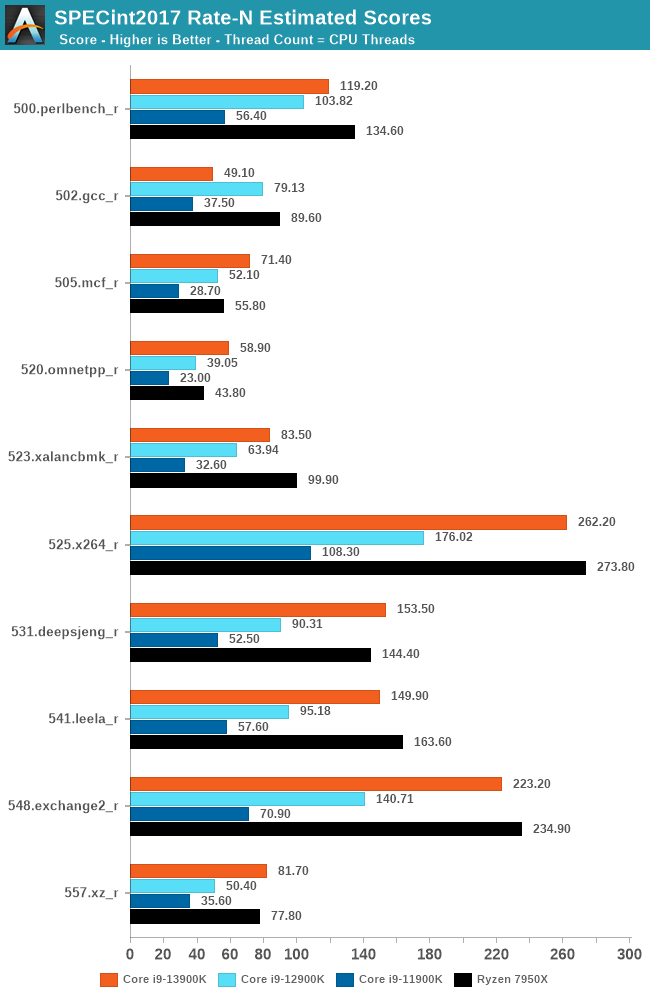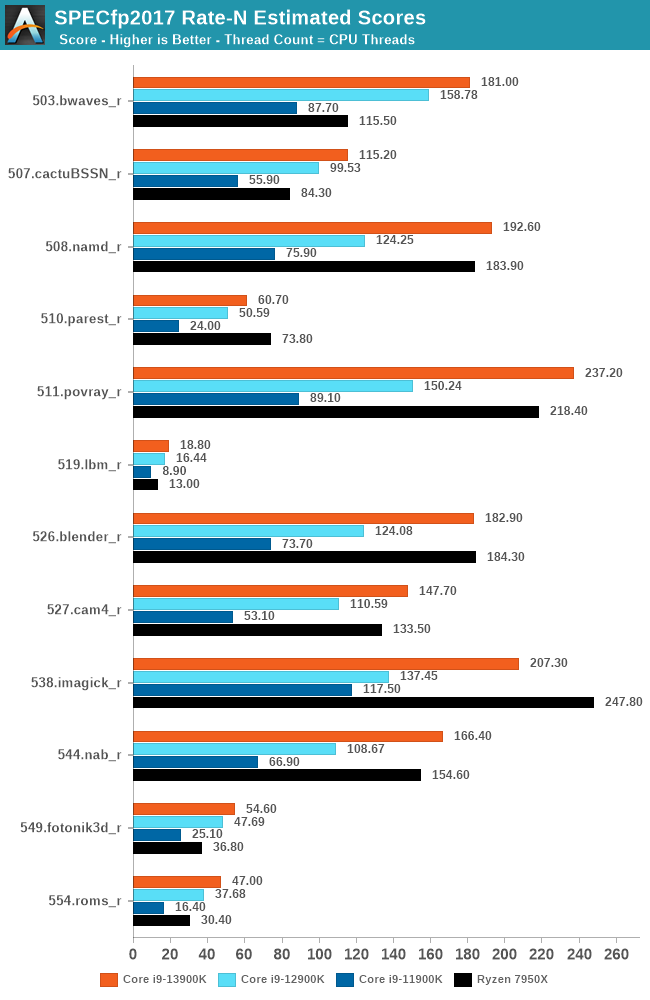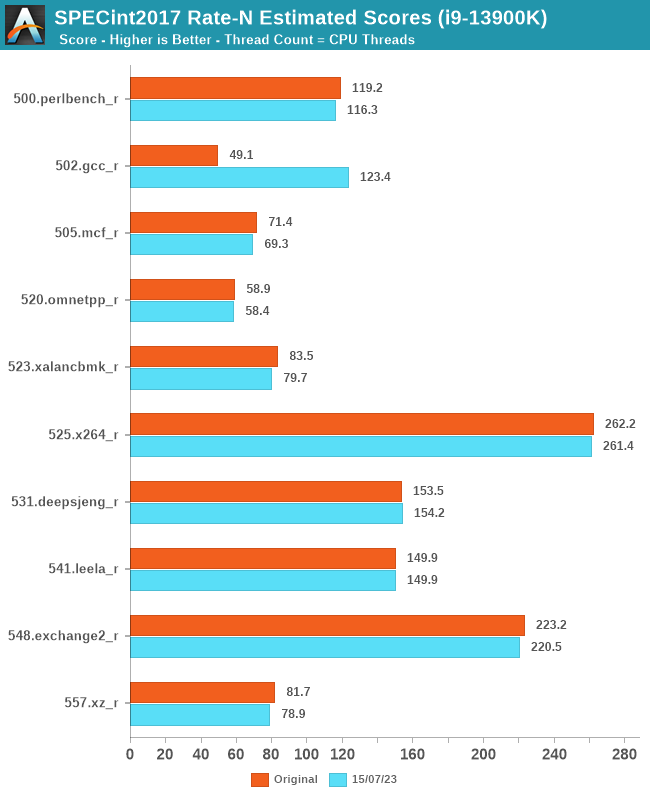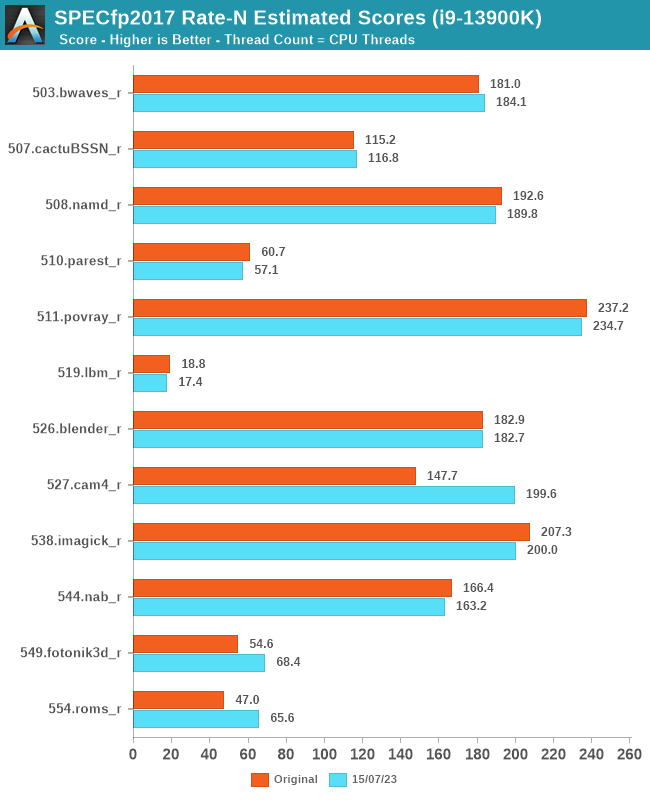Intel Core i9-13900K and i5-13600K Review: Raptor Lake Brings More Bite
by Gavin Bonshor on October 20, 2022 9:00 AM ESTSPEC2017 Multi-Threaded Results
Single-threaded performance is only one element in regard to performance on a multi-core processor, and it's time to look at multi-threaded performance in SPEC2017. Although things in the single-threaded SPEC2017 testing showed that both Zen 4 and Raptor Lake were consistently at loggerheads, let's look at data in the Rate-N multi-threaded section.

Looking at the data in our first part of SPEC2017 (int) nT testing, we're seeing similar trade-offs between Raptor Lake (13th Gen) and Zen 4 (Ryzen 7000) platforms. While Raptor Lake won in the 500.perlbench_r single-threaded test, Zen 4 has the lead by around 13% in multi-threaded performance, despite the Core i9-13900K having eight more physical cores (albeit efficiency cores).
One stand-out part of our SPECint2017 multi-threaded testing is just how far ahead the Core i9-13900K is ahead of the previous Core i9-12900K in multi-threaded tests. This comes thanks to more cores (2x the E-cores), and higher turbo frequencies. For example, in the 525.x264_r test, the Core i9-13900K is nearly 50% better than the i9-12900K; the only part where Raptor Lake failed to outperform Alder Lake was in the 502.gc_r test.

Moving onto the second half of our SPEC2017 multi-threaded results (Floating Point), the Core i9-13900K really does show itself to be a formidable force compared to Zen 4. In the majority of SPECfp2017 tests, the Core i9-13900K is ahead in multi-threaded performance. The improvements in overall performance from Rocket Lake (11th Gen) to Alder Lake were decent, but the improvement from Rocket Lake last year in Q1 2021 to Raptor Lake today – a more useful metric for the usual 2-4 year hardware upgrade cycle – is very impressive indeed.
Summarizing the SPEC2017 multi-threaded results, in some areas Zen 4 is the winner, some areas Raptor Lake (Raptor Cove + Gracemont) is the winner. It is incredibly close in quite a few of the tests, and without sounding negative on the Zen 4 architecture here, but Intel has done a very good job bridging that initial gap to make things competitive against AMD's best.
Update 18/07/23
Following on from our initial results in our SPECint2017 Rate multi-threaded testing of the Core i9-13900K, we wanted to investigate the 502.gcc_r result, which we believed to be an anomaly of sorts. We observed a score of 49.1 on the Core i9-13900K, which, compared to the previous generation Core i9-12900K, is a regression in performance; the result was around 37% lower than the previous generation.
To investigate further, we've re-tested the Core i9-13900K using SPEC2017 Rate to identify any issues and to see if we could further replicate the issue or, at the very least, provide a more up-to-date list of results.

Looking at our updated SPECin2017 results, we are comparing the original Core i9-13900K data to the new data for comparative purposes. Although the results are very similar in many cases, we can see some slight regression in a few results, which could be attributed to various factors, including Windows 11's scheduler, power budget, or just general variance in running.
The biggest highlight of our re-test is the 502.gcc_r result, which seems to be an anomaly for the original run. We've run SPEC2017 numerous times to confirm that the above results are exactly where they should be.

Focusing on our latest results for SPECfp2017 Rate N, we can see a similar story, with very similar results in multi-threaded SPEC2017 performance as with our original testing. In fact, a couple of the results yielded slightly higher results, which could be simply down to scheduler maturity, OS-related improvements including the scheduler, or overall firmware maturity. The results include 527.cam4_r, 549.fotonik3d_r, and 554.roms_r, which show better gains in our latest testing, especially compared to the Core i9-12900K, which this chip replaced in the market.
The biggest takeaway from our re-testing is the updated SPECint2017 Rate-N result for 502.gcc_r, which shows that our original results were nothing more than an anomaly, and we've been unable to replicate the issue.
Update: 07/22/23
We are aware of potential issues with memory capacity, and as such, we are re-running the Core i9-13900K with higher capacity DDR5 memory at JEDEC settings relevant to the platform. We have done a run with 64 GB instead of the regular 32 GB, which with the Core i9-13900K is 2 GB per thread (2 GB x 32 = 64 GB). Looking at preliminary results, we aren't seeing any major variances in these results.










169 Comments
View All Comments
WannaBeOCer - Friday, October 21, 2022 - link
Did you even read the article? Intel advertises the 13900k as a 253w chip. It drew 32% more than it advertised while AMD advertises its 7950x as a 170w and it drew 30% more than they advertised.“Processor Base Power
125 W
Maximum Turbo Power
253 W” Reply
Wrs - Friday, October 21, 2022 - link
You're comparing the PL2 of one chip with the TDP of the other. Also, the article mentioned the motherboard may have something to do with ignoring the PL2 on the 13900k.If the chip can't dissipate PL2, it'll incrementally step down to TDP gracefully. It's like you're complaining your 130mph sedan went 165mph on the race track... Reply
Gastec - Sunday, October 23, 2022 - link
Oh, so the motherboards are the culprits for overclocking the CPU's to new height of financial success, not Intel? ReplyWhatYaWant - Thursday, October 20, 2022 - link
7600x seems a bit overpriced, doesn’t it? Replyingwe - Thursday, October 20, 2022 - link
Yeah it does. $250 seems like a better price--maybe even a bit lower. It will probably come down. I just picked up a 5600 for $125 though so I am set. I suspect that the price will only come down on the 7600x once the stock of 5 series is cleared out. Replymeacupla - Thursday, October 20, 2022 - link
I am happy that Raptor Lake offers stiff competition to Zen 4. Hopefully AMD brings down the price of 7600X, and hurry up and launch their B650 boards Replycaqde - Thursday, October 20, 2022 - link
?? B650 is released? At least on Newegg and amazon you can purchase a selection of B650 motherboards today. Out of the 23 boards listed, 1 is out of stock and 5 are preoders for the 21st or 27th. So that leaves 17 boards that you can purchase today that are in stock, the in stock boards go from 170-350 (Asrock 650M PG Riptide and Gigabyte B650E Aorus Master respectively). But yeah AMD should and from what I have heard can lower Zen 4 prices to compete with Intel's prices. Replyhaukionkannel - Thursday, October 20, 2022 - link
When AMD release 3d cache versions, it will reduce the prices of normal versions.How much, is interesting question. I expect that AMD also will release 7600 to compete with intel in price, so 7600x may not come down a lot. Reply
meacupla - Thursday, October 20, 2022 - link
Oh, B650 is out already? I saw no news coverage of them, so I thought they were still waiting to be released. Replytechguymaxc - Thursday, October 20, 2022 - link
You list Handbrake under legacy tests however, either the graphs or mislabeled or the tests are not included. Did you test these CPUs with Handbrake? If so, please post the results. If not, please consider testing and updating the article. This is the only workload that matters to me, and the number one reason I come to Anandtech for CPU reviews/benchmarks. Reply